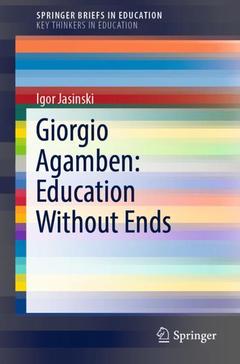Giorgio Agamben: Education Without Ends, 1st ed. 2018 SpringerBriefs on Key Thinkers in Education Series
Auteur : Jasinski Igor

Italian critical theorist Giorgio Agamben may be best known for his political writings concerning the curtailing of privacy rights in the wake of 9/11 and the status of prisoners of war and refugees. Yet, casting him primarily as a political theorist is misleading given his significant contributions to the fields of linguistics, literary theory, philosophy, aesthetics, and religious studies. This book provides the first ever comprehensive introduction to Agamben?s work as it pertains to the field of education. Written in a clear and accessible style, Giorgio Agamben: Education without Ends is an invaluable resource for anyone interested in thinking education beyond its current standardized forms.
The first part of the book creates a context by highlighting formative experiences in Agamben?s biography that reflect a particular idea of education on the threshold between life and work. The second part introduces the notions of infancy, study, community, and happiness, and discusses their relevance with regard to key issues in educational theory and practice. The third part shows how conceptual constellations based on Agamben?s work can inspire studious practices within the spatial, temporal, and curricular infrastructure of educational institutions as they exist today.
Igor Jasinski received an M.A. in Philosophy from Stony Brook University, and an Ed.D. in Pedagogy and Philosophy from Montclair State University. His interests are in continental philosophy, contemporary educational thought, and the role of philosophy as a pedagogical practice. In his dissertation he argued for philosophy with children as a paradigm for a non-doctrinal conception of education. Recent publications include “The Passion of (Not)Teaching: An Agambenian Meditation on the Value of Philosophy with Children” (PES yearbook, 2015) and “Potentialism and the Experience of the New (Ethics and Education, 2016), and, with Tyson Lewis, “Community of Infancy: Suspending the Sovereignty of the Teacher’s Voice” (Journal of Philosophy of Education, 2015), “The Educational Community as In-tentional Community” (Studies in Philosophy and Education, 2016), and “’Trust me, I do not know what I am talking about’: The Voice of the Teacher Beyond the Oath and Blasphemy” (Educational Philosophy and Theory, 2016). He has presented his work at conferences of the Philosophy of Education Society (PES) in the US, and at the European Conference on Educational Research (ECER).
Date de parution : 11-2018
Ouvrage de 99 p.
15.5x23.5 cm
Thèmes de Giorgio Agamben: Education Without Ends :
Mots-clés :
Philosophical Practice; Philosophy of Pedagogy; Giorgio Agamben Biography; Studious Play; Coming Community; Martin Heidegger; Philosophy of Teaching; Philosophy of Learning; Alternative Education; Messianic Time; Experience of Time; Indeterminacy of Language; Educational Community; Eudaimonia; learning and instruction


